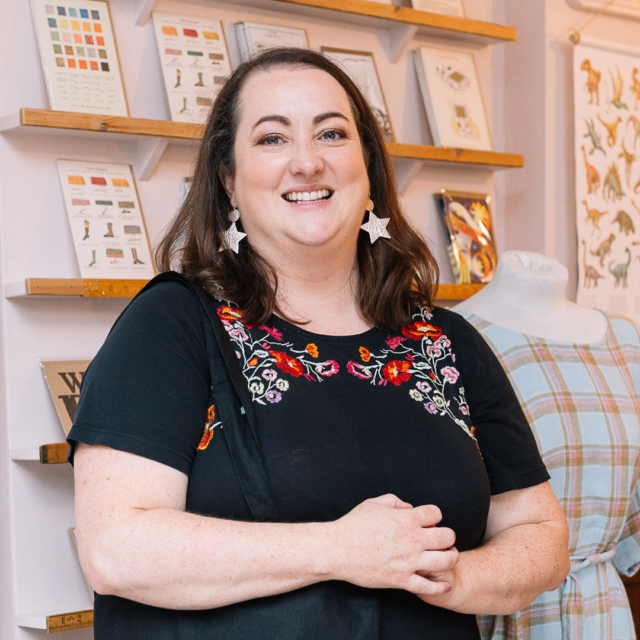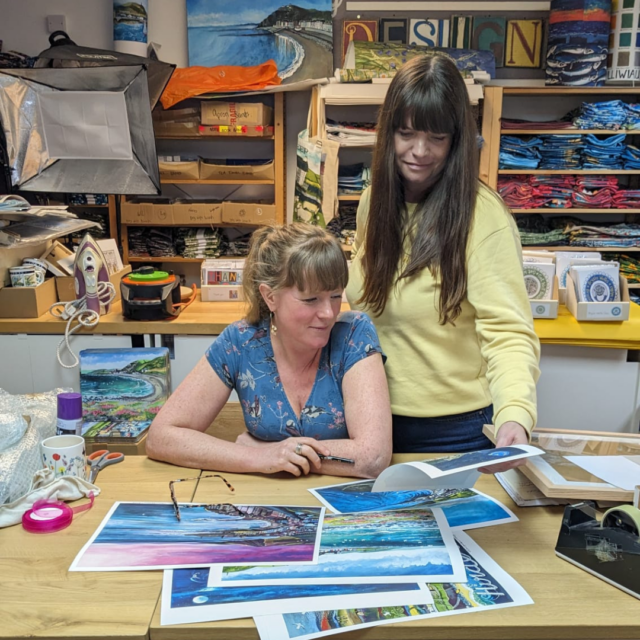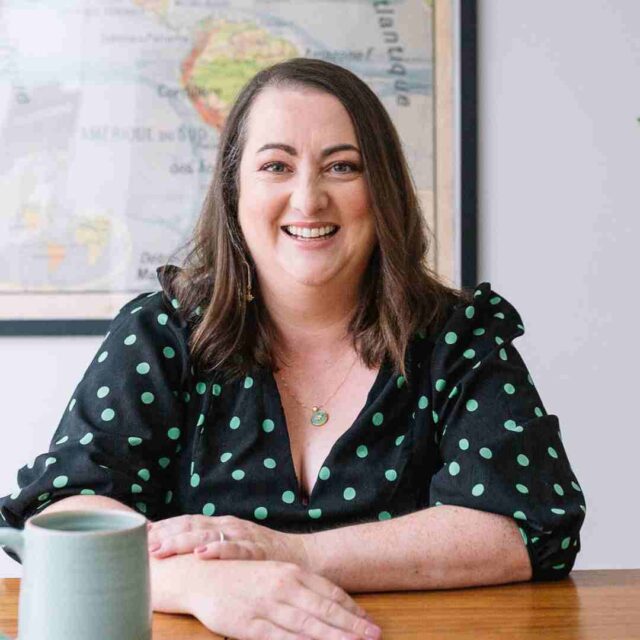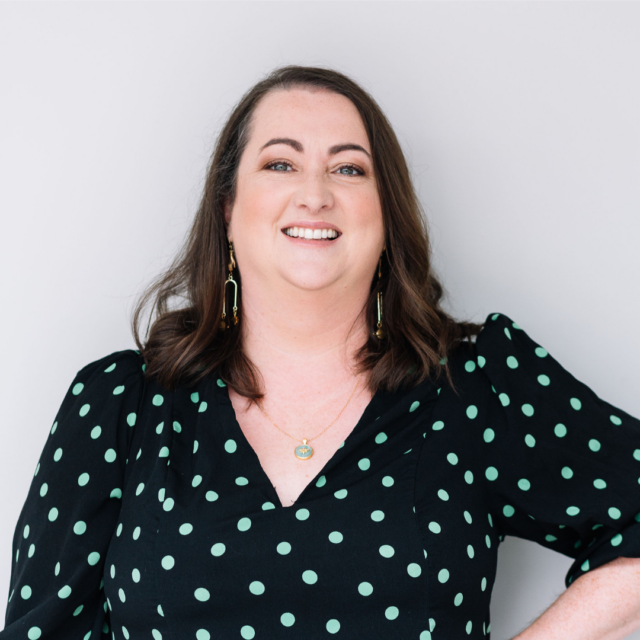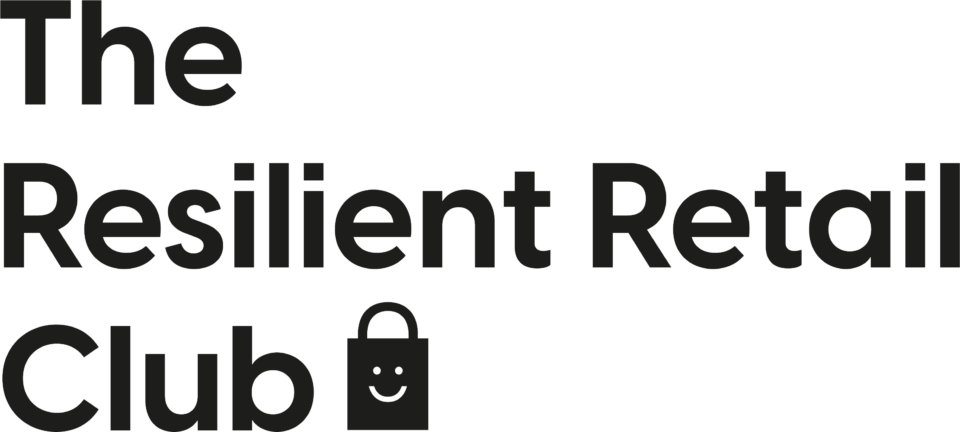Catherine Erdly: Welcome to episode 183 of the Resilient Retail Game Plan. Hi, I’m your host, Catherine Erdly, as well as the founder of the Resilient Retail Club. Resilient Retail Club is my membership group and mastermind for product business owners. You can find out more at resilientretailclub.com. And today we’re joined on the podcast by Ruth Sturdy, who is the founder of Colour Chronicles, and also one of our mastermind participants.
Ruth’s gonna share with us her business story and how the business has evolved and developed over the years.
Welcome to the Resilient Retail Game Plan, a podcast for anyone wanting to start, grow or scale a profitable creative product business with me, Catherine Erdly. The Resilient Retail Game Plan is a podcast dedicated to one thing, breaking down the concepts and tools that I’ve gathered from 20 years in the retail industry.
and showing you how you can use them in your business. This is the real nuts and bolts of running a successful product business, broken down in an easy, accessible way. This is not a podcast about learning how to make your business look good. It’s the tools and techniques that will make you and your business feel good.
Confidently plan, launch and manage your products and feel in control of your sales numbers and cash flow to help you build a resilient retail business.
Hi Ruth, welcome to the podcast. Do you want to start by introducing yourself and your business?
Welcome Ruth Sturdy, Founder of Colour Chronicles
Ruth Sturdy: Yes. Hi Catherine. Thanks for having me. So my name’s Ruth Ruth Sturdy and my business is Colour Chronicles. I launched in 2018 when my daughter was three and I wanted to find a record book that she had an input into as well as me and I couldn’t find one.
And I thought I’m going to make one and it’d be my business. And that’s how it all started.
Catherine Erdly: Oh, fantastic. So that was the book of you?
Ruth Sturdy: The book of you. So record of childhood. So I wanted a book that I was going to fill out because I love writing things down. I always have done, and I was doing a childhood record book for her.
And I just thought she was so chatty age three and had so much to say that I ended up handwriting questions out and asking her and the questions were just brilliant. They were funny. You couldn’t predict what she was going to say. And it was really worth noting down. So I thought there must be a book out there.
So I looked and looked, I really looked and there wasn’t one. I thought, right, I’m going to make one. I’m going to make it inclusive. There’s going to be no judgments. You know, no, no assumptions on family or anything like that. Yeah, that’s how The Book of You was born.
Catherine Erdly: So that was your first product and remains the bestseller to this day.
Ruth Sturdy: Yeah. By a country mile. I have bought out two other books. I put about 90 percent of my sales is the book of you.
Catherine Erdly: Wow. And the, so you have also then the baby book.
Ruth Sturdy: The baby book of you, which again, I wanted it to be really non judgy. Cause I think lots of baby books quite triggering for new moms. You know, you, it tells you your baby should be doing something at a time where maybe it’s not, you know, and then you think, Oh no, it says it should be rolling over and.
It’s just, it can be quite upsetting. So I just wanted it to be. Really, well, for everybody, really non judgy, no assumptions. It just asked for first for this month and it doesn’t, you know, as a mom and a dad and two sets of grandparents, you know, so it doesn’t matter how the baby entered the world or how the family’s made up.
So the books have been really popular with same sex couples, solo parents, adopted families which is really important to me, actually. It’s the whole ethos of the business.
Catherine Erdly: Everything behind it. And then you recently added, or more recently, I should say, you’ve got the book of me and you.
Ruth Sturdy: Yes, confusing, I know, I didn’t think about it in the book of me and you.
So me as an adult, and you is still a child. It’s got grandparents in mind, but it’s all it’s for any adult child relationship. I wanted to bring out a book for grandparents, but I had a friend of mine who was feeling poorly. And she’d asked me to help her write letters to her kids when the time came, which was awful.
But I thought actually for them. They’d want to know the little things, you know, the time she felt her favorite pair of shoes, her favorite time of day, a recipe all the little things that would, you know, those make up who she was for them to be able to remember her. So I bought the book of me and you and me as the adult.
So you fill it out together. So you have different topics. I don’t know, so pastimes, hobbies school what else is there? Things like favorite time of day, favorite seasons clothing, holidays, all those things that just make up who you are. So there’s two thirds for the adult to fill out, and then a third sort of to fill out with the child.
And then it becomes the child’s to keep. Yeah.
Catherine Erdly: So would the idea be that the child asks the adult the Questions.
Ruth Sturdy: So there’s prompts in there, and at the end of each section, it says something you’d like to ask me, something I’d like to ask you, so you get a chance to have conversations you maybe wouldn’t otherwise. Yeah. Wow. Yeah. So it’s a really nice chance to sit and connect, and I’ve done one with my daughter, and I like the fact that, you know, the worst should happen, that she’ll have that and knows It’s all about me, about when I was little and you know, she’s got it there to keep and look back on.
Catherine Erdly: Yeah. No, I completely agree. I think it’s really hard to underestimate, you can’t overestimate, I should say how important those things are. And I think, you know, in my life, I think about people that I’ve lost that if I’d had, like you say, all those things that those like small details, which seem completely trivial in the grand scheme of things, but actually you don’t know a relative or you would like to know more about someone or have that record, then it’s hugely important because that’s ultimately what makes us who we are, right? Those little details.
Ruth Sturdy: Yeah, exactly. I’ve got one recipe of my granny’s and it’s her beautiful old fashioned handwriting and you know, just the pen on paper and the fact that she touched it and it just, it’s really special.
You know, it’s just something about pen on paper and being able to touch something that somebody’s touched. So, You know, that’s why I know in the digital age and everything’s lovely and it’s great, but just to have that tangible, you know, book you know, I think it’s quite special. Yeah.
Catherine Erdly: And it’s, and I’m sure it becomes one of the most valuable things that people own.
Ruth Sturdy: Oh yeah. People say it goes from being a notebook to something they’d save in a fire.
Catherine Erdly: I believe it. Yeah. Yeah. Especially as you say, though, in a situation like your friends, which is so difficult and you really don’t know what to say or do, if you’ve got that something that she can give her kids.
Ruth Sturdy: Yeah. And also when you’re in that situation, it’s where’d you start? Where’d you start on the letter on your wedding day? Or, you know, it’s just it’s such a lot, but actually having a book that’s. But fun prompts, easy prompts, you know, things that make you talk, I think it’s very comforting to know that you’ve given them that, you’ve given them the memories.
Catherine Erdly: Yeah. Yeah. And without everything having to be this sort of big life changing advice, it can just be something as simple as, yeah, a recipe or something like that.
Ruth Sturdy: Things to watch, music to listen to, it’s all the little things.
Catherine Erdly: Yes. Yes. Yes. It’s interesting you touched on the digital age because I suppose that is, well, what’s going to be one of my questions around
How important do you think it is in a digital age to have something physically written down? Is it even more important?
Catherine Erdly: how important do you think this is in a digital age to have something physically written?
Do you think it becomes more important?
Ruth Sturdy: I do. I do. Even so with my children’s books, they love looking back. They love looking back at their handprints. They love looking back at the way they drew things. But when my daughter was four, she was all about belly buttons and eyelashes. And so she’d do a flowery poetry.
And then when she was five, it evolved a bit more in the six. So you just see the progression in one very easy once a year thing to do, sit down and do together. You write your name, do the, you know, her first signatures in there. I think it’s important, even for my own handwriting, to look back and see what I’ve written and remember.
And you think you won’t forget these things, but you do. You can actually see how I did.
Catherine Erdly: Yeah. And I think it all just blends together, doesn’t it? That’s how I feel. My children are 13 and 16 now, and It does disappoint me. Was that when they were four, when they were five? Or sometimes, you know, when people, I have friends with younger children and it’ll be a birthday and I’ll think, what would a six year old girl want?
What did my daughters are like at that time? And you think, oh, I’ll never forget this stuff, but it’s so easy to. And it’s all kind of rock and roll.
Ruth Sturdy: Yeah, especially since I’ve never got an idea of what time anything is.
What was Ruth’s background before she started the business?
Catherine Erdly: That’s so true. And what was your background before you started the business?
Did you ever think you would end up running your own business?
Ruth Sturdy: So I knew I wanted my own business. So I used to do a national sales manager role for an electrical manufacturer, which sounds really boring, but it was really fun. And I loved the whole world. But if you’re not in it, it’s, you know, it is boring.
But it’s not sustainable whilst you’ve got children to be out on the road all the time. And I, so I knew I had back to back maternity leaves and I didn’t go back again and I knew I wanted to do something for myself. And then I was actually looking at opening up a sort of play cafe in Clopham which would have been fantastic.
But then just trying to find a place or whatever, it just didn’t work out. Then I thought actually it’d be good to have a product business. But I had no idea what that product would be. And it was. Wanting it, it was trying to find this product and then it was like a light bulb moment of this doesn’t exist, you know, my husband’s well, people aren’t like you, you write everything down and I said, I think people are like me, you know, I said, people like to have the memories,
Catherine Erdly: And it’s just how many thousands of books have you sold now?
Yeah. Yeah.
Ruth Sturdy: He’s well, I’m sure I helped the idea. I was like, no, I don’t think you did. .
So I helped with the colors. I say, yes, you helped with the colors, .
Catherine Erdly: So you started in 2018? . And I feel like we must have met not that long after. I feel like we met me the 2018 and 2019. Yeah.
How has Ruth’s business evolved?
Catherine Erdly: So how has it evolved since the early days?
Ruth Sturdy: So when I first started. So I put in an order for 3000 books. So I just went, right, you know, let’s go for it. And they all got delivered at home. My husband was like, have you got any idea what 3, 000 bucks looks like? I was like, no, and they were everywhere. So they turned out, we had to, I had a whole wall in our spare room. We had to move the sofa.
And I said, well, this is how businesses start, right? And then I moved to a facility, moved to a lockup, got to a lockup, that was huge. And I moved off the kitchen table and took over the biggest bedroom. Just had a rejig around at home. Then I got a bigger lockup, which was another big day, but the biggest move was moving to a fulfillment center.
So we moved house, we moved from Clapton to Southeast London, 2022. And I moved to the fulfillment center there, which has honestly been life changing. It’s just so good knowing that the orders are just sent out. You know, I’m not having to do that side of things. I can work on the business. I can take proper time off.
That’s been the biggest thing that’s changed.
Catherine Erdly: So that was still four, four years in. Yeah. The first four years you were sending out every single order.
Ruth Sturdy: Every single order. Every single order.
What was the moment that Ruth realized she needed to stop doing everything herself?
Catherine Erdly: What got to the point where you felt like this has to stop? I have to switch.
Ruth Sturdy: I had to drive home from a holiday once because I’d taken a load of books with me and then my printer and everything.
So I could still send orders out and I didn’t have the right one. So I had to drive home, send out a load of orders. I was only from Dorset, but still, and I I had to do it, you know, cause I couldn’t bear turning it off. But actually lockdown was fantastic for me because I could do all the orders.
I could, you know, just go straight to the post office every day. With my bags in front of the queue alright. So yeah, so that, it was, the timing worked out really well, funny enough.
Catherine Erdly: So it was that holiday then where you just thought, you know what, there’s gonna be a better way of doing this.
Ruth Sturdy: I knew there would be a better way.
Yeah, I knew because I could never work on the business. I was just always just get, getting the orders out there was always the priority. So it’s just freed up so much time. Yeah. It’s really been life changing.
How many fulfillment centers did Ruth look at before finding “the one”?
Catherine Erdly: And was this the first fulfillment center that you went with, or did you have to interview a few?
Ruth Sturdy: First one I went with I did look at a few and these guys, they’re great. They’re great at what they do. When I’ve had to change the business slightly, they said they’d do the gift wrapping. And I’d get some pictures of it with masking tape wrapped and I was like, okay. Cause I’d always do gift wrapping and handwritten cards and that had to go.
So that was a shame, but it, that had to go and that’s okay. It’s evolved and there’s still boxes they can go in. But it’s just the step up from being the really small business, to the next stage.
Is fulfillment what has allowed Ruth to grow without having a big team?
Catherine Erdly: Absolutely. And do you think that then the fulfillment center has been one of the main ways that you’ve been able to grow without having a big team?
Cause when I talk to people quite often, what they’ll say to me is I want to grow the business. I want it to be bigger. I don’t want to necessarily have a big team. I want it to be quite lean if you like. And I feel like you’re in a place now where that is basically your business model. This is, it is pretty lean and do you think fulfillment’s kind of the biggest piece of that puzzle and are there other pieces?
Ruth Sturdy: Fulfillment is the biggest piece of that puzzle. Also I do have someone fabulous doing my digital marketing. I think knowing what you’re capable of and knowing what you can learn, like I love learning and I love doing things myself but there’s things that I can’t do myself and the digital marketing side of things, you know, so lucky to find the guy that I use and he’s just fantastic and I speak to him every few weeks and he’s brilliant. He’s like a voice of reason, very sensible, looks at things completely differently and I’ve got a brilliant accountant as well. And she keeps all my numbers safe and, you know, lets me know what’s going on.
So I think it’s about knowing. What you can’t do yourself and then what you can do yourself and not being afraid to do it. Yeah, that’s it. And it’s also working out that you can’t do everything, Pinterest, for example. I tried that one and I just said no.
Being okay with not getting those orders because I haven’t got the time to do 20 pins a day or whatever it is that you need to do. And I don’t think it’s worth paying for it. So working out what it’s worth paying for and what’s going to give you the most return and also what you’re willing to learn and want to learn and want to do yourself.
Catherine Erdly: Yeah, no, that’s so true. It’s just being really realistic, as you said, about where your strengths lie. And also I often say this to people, it’s thinking about the bits that you can’t outsource. You know, you have to be the creative direction of the business. You have to think about the strategy and the direction.
And. It’s working out what else other people can do for you when they can’t do this main piece. You’re the only one who can drive the business and get it to where it’s got to.
How did Ruth know it was time to invest in outside help?
Catherine Erdly: One question that I quite often get asked by people who are in this growing stage is when you get to that sort of chicken and egg place where you think, I know if I outsource, say for example, digital marketing I know if I outsource it.
It could potentially bring me more money, but I don’t feel like I have the money right now to outsource it. Do you see what I mean? So did you have that point or did you just have to take the plunge and say I’m just going to trust that this is going to pay itself back?
Ruth Sturdy: So I think give yourself a three month trial, you know, go all out for three months.
But get advice from an expert because it’s very easy to try and do it yourself and have, you know, which I did probably a year before I did it properly and realizing I couldn’t do it. And also just surround yourself by people who are in the same position, you know, your club’s brilliant for that.
So it’s not about knowing how to do it yourself, but it’s about knowing who to ask to find the right person to get it done. And that’s invaluable, you know, that really is invaluable and it’s able, and then you’re able to get somebody that you know has already been vetted, if you like, and trusted. And that’s the best thing to do, but I would say, yeah, three month trial.
So work out what you can afford to spend. And then give it a really good try make sure you’ve got really good content for your ads. That’s really important. So you’re really happy with it. And again, get advice, get people to look at it. What would you change? Have a look at similar ads running, which ads do you click on, and then just try it. Yeah. There’s no harm in trying.
Catherine Erdly: Yeah, I know. That’s so true. I think that’s a real mind block people get into is that this sort of like they, they get feeling stuck by like that you just have to three months. Can you make it work in three months, which is sometimes tricky with digital marketing because you know, especially in that first three months you’re learning a lot, but I think it is so true about word of mouth.
How connecting with people in the Club and Mastermind can help grow your business
Catherine Erdly: Then we do that obviously in the club and in the mastermind as well. I know that’s a big piece of it. It’s just being around other people going through. Something similar and grappling with the same issues, because I don’t know if you find this, but I know certainly I hear from a lot of people who’ve been going, say, for example, you’ve been going for, will be six years this year.
And there is a point at which a lot of the business advice tends to be more basic or more beginner focused.
Ruth Sturdy: Yeah, absolutely. And sometimes what you need is just a bit of reassurance that everyone’s good at it all. Or just to curb the loneliness really, because you are on your own you know, you are in your own head as well.
So having different people to ask and the advice you get is always fantastic. And it’s always nice to give advice as well. And to people who are at the same stage as you,
Catherine Erdly: To pool resources and pool knowledge. Yeah. Obviously the, this is called the resilient retail game plan.
What is the best gift that you could give someone who is just starting out?
Catherine Erdly: So can you tell me about a time in your business where you’ve had to be resilient and what, how you got through it?
Ruth Sturdy: Well, I was thinking about this actually. And I think it’s little thing after little thing. It’s like a constant being resilient, you know, saying, Oh, they’ve got the baby book in in the book of you or Oh, it’s the wrong color or. To delay deliveries or that stock’s not there.
So it’s little things.
And I think you do become more resilient. So things that at first would have absolutely floored me. Now I’m a bit calmer about it and you realize, well, what can you do? It’s not the end of the world. It’s all fixable. And having the resilience is fantastic. And it’s such a good name for your company, for your brands, you know, being resilient is so needed, you know, even if I wasn’t getting sales or things weren’t happening, you know, I would be really upset about it, really worried about it. But you do build up this resilience. And if you could give that to somebody, when they first start out, that would be the best gift you could give them.
Catherine Erdly: That’s so true. Yeah. It’s I like what you said there. It’s like things that would have floored you. You do. Do not get a thick skin, that’s not quite the right word, but there is a point at which you realize that nobody’s died.
Ruth Sturdy: Yeah, exactly. He’s off the big way. I went to, I went away with another mum to Central Isles.
We took the children and I got a phone call and I thought, I’m not going to take my laptop and just really enjoy myself. And I had a phone call saying, Oh, it said there were 50 pink books in the shop, actually there’s none. And we’ve got 20 orders. And I was like, Oh, wonderful. So it’s Oh, you know, and it’s just a slog and say, right.
You just need to get this done. You know, sit down, just get it done. Just, you know, tackle it all and it’s fine. But yeah, don’t panic, Mr. Romain Rousseau.
Catherine Erdly: Yeah, I remember when I worked in the bigger retailers and, you know, there would always be something that would be this huge disaster. You know, something didn’t show up for the launch or some dress that was in all of the ad campaigns didn’t make it to the stores because the warehouse sent them to the wrong place.
Or somebody in the team one time keyed in, accidentally keyed in the store number instead of the quantity and sent like 2000. So. Fever arches to the wrong store and they just send a van to go and collect them at great expense. And it does feel like life and death and I had one manager who used to say, no, I’m not being funny, but we’re not saving lives here.
Ruth Sturdy: Yeah. Yeah. Yeah, exactly.
Catherine Erdly: It’s even harder when it’s your own business though, isn’t it? Because it’s it feels like that so much of the time, like it is very personal. It’s your business, it’s your baby.
Ruth Sturdy: Yeah, it is personal, you know, it’s, it feels personal, it does feel personal. And it’s quite addictive as well.
You know, the more you do, the more it gets done, you know, so you have to really strike a balance. And that’s another thing at first, you know, is wanting to be working all the time and as you know, as you get a few years down the line, you realize it’s okay to be off when you’re off and when you’re working, you make sure you’re really working.
Yeah. Yeah.
Catherine Erdly: Yeah. More work when you’re at work and less work when you’re not at work.
Ruth Sturdy: Exactly. Exactly.
Catherine Erdly: That’s my mantra for this year.
Yeah.
What’s next for Colour Chronicles?
Catherine Erdly: So what’s next for Colour Chronicles?
Ruth Sturdy: Well, I’ve got so many book ideas going round in my head, but it’s It’s such a big thing to launch, you know, it’s a big commitment and also just trying to get them out there as well.
And then the confusion that comes in. But I think actually the next thing I’d like to do is take the book of you and the baby book of you overseas, that would be the next thing I’d like to do. And then I’d also like to get the book of me and you a bit more well known in the UK. So that’s what’s next for this year anyway.
Yeah.
Catherine Erdly: Well, fantastic. Well, thank you so much for joining me. It’s really great to have a chance to sit down and really talk things through and get the whole story from start to where we are now.
How to connect with Colour Chronicles
Catherine Erdly: And do you want to tell everyone about where they can find out more about your business?
Ruth Sturdy: Yes. Yeah, thank you for having me.
I really appreciate it. I’m fangirl cause I listen to the podcast all the time. And so you can find me on Instagram at Colour.chronicles. Or my website is colourchronicles.com Thank you.
Catherine Erdly: Thank you so much for tuning in. I hope you enjoyed today’s conversation. If you have a moment to rate and review the podcast in Apple Podcasts, that would be absolutely fantastic.
And also if you rate the podcast within the Spotify app, then that also helps me get the podcast out there in front of more people. Why not hop over to Instagram? Let me know what you thought about today’s episode. And of course, if you want to know more about The Mastermind, which will be opening up again in March.
Then drop me an email, katherineatresilientretailclub or DM on Instagram and let’s talk.

